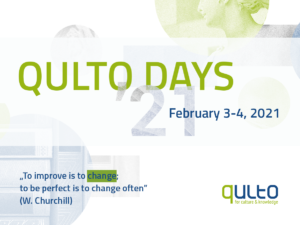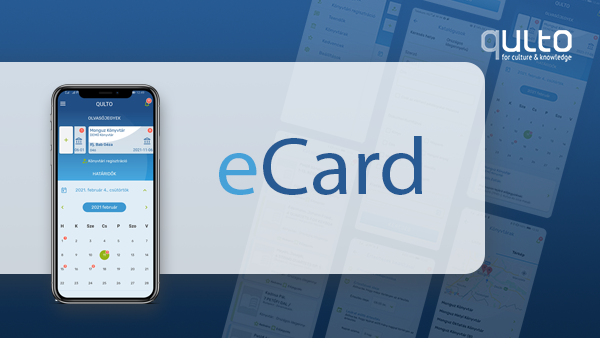Summary of Qulto Days 2021
2021. February 19.

We held our first two-day online Qulto Days event on February 3-4, 2021, with a record number of more than 450 registered participants. Due to the epidemiological circumstances that still exist, those interested could follow the program on several online platforms.
We chose a Churchill quote as the motto for our event, emphasizing that even if there has been a lot of change in our lives and work, a lot of change and adaptation will bring development and is an essential part of life.
“To improve is to change, so to be perfect is to change often.”
During the event we presented the digitization strategies of public collections, the tools supporting digitization and the examples of adaptation to COVID-situation through Hungarian and international examples.
The first day consisted of two main parts: the first set out the company’s key achievements, developments and directions for 2020, and in the second part invited guests, collection managers, librarians and museologists reported on their innovative solutions and experiences with the pandemic (Covid edition).
In the introductory part company managers László Kármán, Miklós Czoboly and Gyula Tarjáni evaluated the past year, emphasizing that the development did not stop, in fact, many organizational changes have been applied in order to make the operation of the company more efficient and transparent. These included a review of processes, the introduction of new processes, and the expansion of the Monguz team with experienced colleagues despite the pandemic. Our goals for 2021 include further improving results, strengthening communication (through online channels and customer satisfaction measurement), and expanding our product portfolio with newly completed or completed applications.
In his opening presentation János Pancza, QULTO’s portfolio manager, presented Qulto’s digital ecosystem, the elements of which are:
· Manage (e.g. Qulto ILS, IMS)
· Digital (e.g. Digitize, SimilR)
· Connect (e.g. OPAC3, FRBR catalog, ReCatalog, eCard)
· Attract (e.g. Education, CityConquest)
Regarding the Qulto2 platform he emphasized that it is FOLIO-compliant, has a microservice architecture and is entirely Hungarian, using technical implementations such as Docker, Keycloack authentication and React.
In our second presentation dr. Endre Fülöp system-engineer spoke about the different solutions of the Qulto semantic knowledge network, one of the exciting applications of which is cultural tourism. This was shown on the example of our LiteraTour application, with which our mobile phone can indicate if we are visiting a famous place of a literary work or vice versa: we can use a map to see what works are about the given city we are going to. In addition, this knowledge network can be used in the field of libraries: a FRBR catalog combining copyright information and editions of a work can be created with its help.

Our third, and perhaps most anticipated, presentation was about the mobile apps completed in 2020 and launched this year. Zoltán Erdős, head of the development department, presented the recently launched Qulto eCard application in the Google Play store, which allows readers of libraries to conveniently do their library affairs from the couch or the bus: they can extend, book, request a reservation, they can check what documents they are currently borrowing and if they have a debt. They can also set how often they want to be notified of upcoming deadlines in the application. The biggest news of the presentation was when we announced that the Qulto eCard application would be configured free of charge for libraries with a Qulto support contract, thus helping their digital presence.
In our fourth corporate performance, we wandered in the direction of the attraction. Gábor Deák, leading developer, introduced mobile and web applications mainly in the field of cultural tourism:
· With the help of our CityConquest 2.0 web application institutions can create cultural thematic tours related to the spectacles of the city, as well as quizzes and playful tasks.
· QuestionBank: an online quiz database that can generate questions based on the Qulto semantic knowledge network without the institution having to spend hours manually registering questions and answers in various applications.
· Qulto360: unlike mainstream international service providers, we can create a virtual exhibition of spherical panoramic images in a web application with several functions. With the help of the application, not only a phisycal space can be explored, but also digitized public treasures can be displayed virtually, setting markers,providing images, audio, video or even 3D objects, so that the user not only walks around the space, but also gets more information and stories.
· Storytelling: a new Qulto application for creative content creation that provides a “mindmap” view for learning a story, enabling a virtual exhibition to be more than just a linear experience, but also a freely traversable knowledge transfer based on user interactions.
· LiteraTour: the mobile application based on the Qulto Semantic Knowledge Network, which not only recommends literary works to the user based on different filters, but connects them (and their characters) to real locations, tourist activities, and notifies the user if there is a venue of a work nearby – making literature a part of our everyday lives.
In the second unit of the Qulto Day we could hear from Dr. Béla Lóránt Kovács, the director of the Méliusz Juhász Péter Library in Debrecen, about their latest, non-contact library service: a book vending machine with RFID technology similar to Foxpost machines. Such vending machines have been installed in several parts of the city, and after the books have been delivered, readers can pick up the volumes they want to borrow at any time with their reader tickets, as well as take the documents back to the vending machines.
Péter Szóllás, Head of Public Collection Department in the Ministry of Human Resources (EMMI), summarized the strategies of the libraries during the epidemic situation and also told about what central services they tried to help with information sharing on online interfaces and the summaries of the Library Institute from the library practices of the surrounding countries.
The Qulto event ended with a meaningful roundtable discussion, in which participants shared their library’s experiences with services provided during the pandemic and how permanent closure changed their work organization methods and interactions with readers. All our speakers emphasized that they worked mostly to build a stronger online presence for both readers and colleagues through various available forums and solutions.
On our second day we brought partner institutions from Romania and Poland to showcase their digitization practices and give strength and motivation to the staff of all institutions closed due to pandemics, that their work makes sense, and thanks to librarians and museologists, we get more and more information and knowledge digitally.
Here, too, we would like to thank all our speakers and the audience for staying with us online. We hope that our Central-East-European company can help more and more cultural institutions and public collections to share their heritage and engage audience.
Thank you for your support and we hope we can build 2021 together.
Some presentations are available here:
Gyula Tarjáni – 2020’ achievements
János Pancza – QULTO Ecosystem
Hedvig Brada – Heritage in my smartphone
Diana Ghiorghieș – Qulto eCard mobile app
Recordings of the Qulto Days can be found on our Facebook page here:
https://www.facebook.com/1444602202490827/videos/1078589535948662
https://www.facebook.com/1444602202490827/videos/2741476452769629